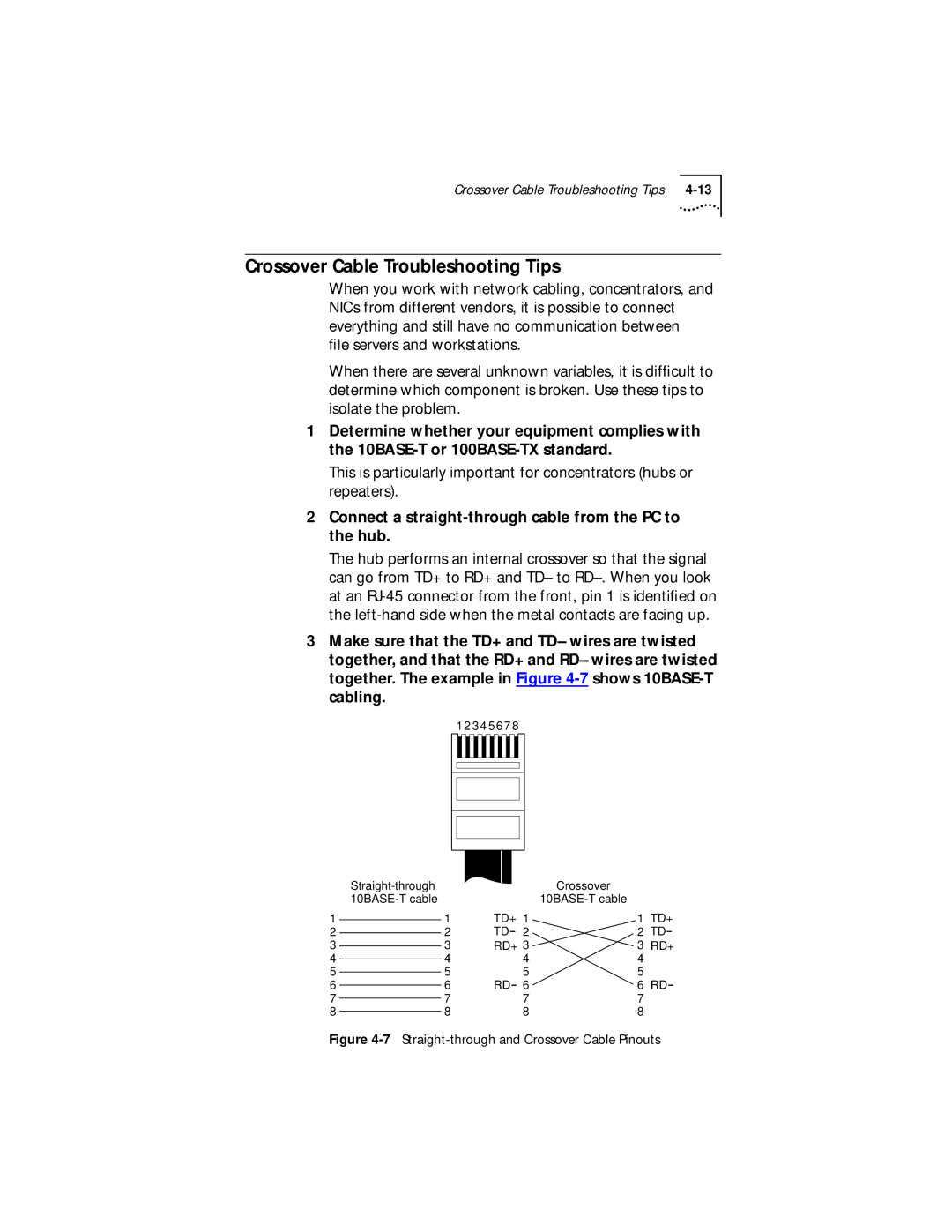PCI 10/100BASE-TX
3Com Corporation 5400 Bayfront Plaza Santa Clara, California
Contents
Troubleshooting
Specifications
Page
Figures
Tables
Lifetime Limited Warranty
Australia, New Zealand Sweden, Finland, Norway
Asia Japan
Denmark
Belgium, Netherlands, Luxembourg United Kingdom, Eire
About this Guide
Finding Specific Information in This Guide
If you are looking for Turn to
Conventions
Icon Description
Convention Description
13C905B-TX NIC
Introduction
Industry-Leading Performance
DynamicAccess Software
Remote Wake-up
Installation and Configuration
10/100 Mbps Support
PC and Server Requirements
3C905B-TX NIC
How Do I Install the 3C905B-TX NIC?
Installing the NIC
1Inserting the NIC
Secure the NIC with the screw you removed earlier
2Connecting the Network Cable to the RJ-45 Port
Connecting to the Network
Reconnect all cables and replace the PC cover
Connecting the Remote Wake-up Cable
Windows
Installing
If Windows prompts you to reboot, click No
Network components should now include
Click OK
Confirming Installation
Click Yes
Click the Device Manager tab
Windows NT
Windows NT Version
Updating the Network Driver
Installing the Network Driver
Click Update
Click Cancel
Network Settings window, click Close
Click Continue
NetWare for Windows 3.1x, Windows for Workgroups, and DOS
Run the Install program. Enter ainstall
AutoLink Requirements
Running the AutoLink Program
NetWare Version
Installing the Novell NetWare Server Driver
Press Enter to continue the server installation
Multiple NICs
At the A\ prompt, enter nwserver
Network Text File Name Network Driver Name Operating System
Supported Network Drivers
Status LEDs
Troubleshooting
Description Flashing Steady Off
3Com NIC Diagnostics Program
Select 3Com NIC Utilities Select 3Com NIC Diagnostics Help
Accessing the 3C905B-TX Help System
Running the NIC Self-Test
Select 3Com NIC Utilities Select 3Com NIC Diagnostics
Eeprom Fifo
On both PCs
Running the Echo Test
43Com NIC Diagnostics Program Support Screen
3Com Support Services
Generating a Problem Report
5Problem Report Main Screen
To exit the program, click Cancel
Checking the Remote Wake-up Function
Removing the 3C905B-TX NIC Pace and 3NICDIAGS Software
Windows 95 and Windows NT
Windows Control Panel, select Add/Remove Programs
3Com DOS Diagnostic Program
Verify the driver version
Remove the PC cover and check the Remote Wake-Up connection
Connect a straight-through cable from the PC to the hub
Crossover Cable Troubleshooting Tips
Troubleshooting Hubs with Crossover Cable
Question Answer
Frequently Asked Questions
Add/Remove Programs
Question Answer
QuestionAnswer
What is a Magic Packet?
Accessing the 3Com World Wide Web
Page
Changing Configuration
Configuration Settings
Option Default Setting Available Settings
Displaying Configuration Settings
Changing Configuration Settings
Click NIC Details to display the NIC Details screen
Changing Configuration Settings
Selecting Pace Applications
Changing Pace Configuration
Select the protocol that the application uses
Changing Pace Ranges and Protocols
Using the DOS Configuration Program
Setting Fast IP
Pace Advanced Options
Specifications
Specifications
Figure A-1RJ-45 Connector Pin Assignments
RJ-45 Connector Pin Assignments
Online Technical Services
3Com Bulletin Board Service
World Wide Web Site
Access by Analog Modem
3ComFacts Automated Fax Service
Access by Digital Modem
408 654
Support from Your Network Supplier
3ComForum on CompuServe Online Service
Log on to your CompuServe account Type
Press Return to see the 3ComForum main menu
Support from 3Com
3Com Iberia
Regional Sales Office Telephone Number 3Com GmbH
3Com Latin America
3Com Mediterraneo
Country Telephone Number Fax Number
Returning Products for Repair
Glossary
DynamicAccess software
DRMON
Full scatter gather
Network interface card NIC
Infinite bursting
10/100 auto-negotiation NWay
Pace technology
Numbers
Index
NIC
Index
Page
3Com Corporation Limited Warranty
FCC Class B Statement
FCC Declaration of Conformity
Page

